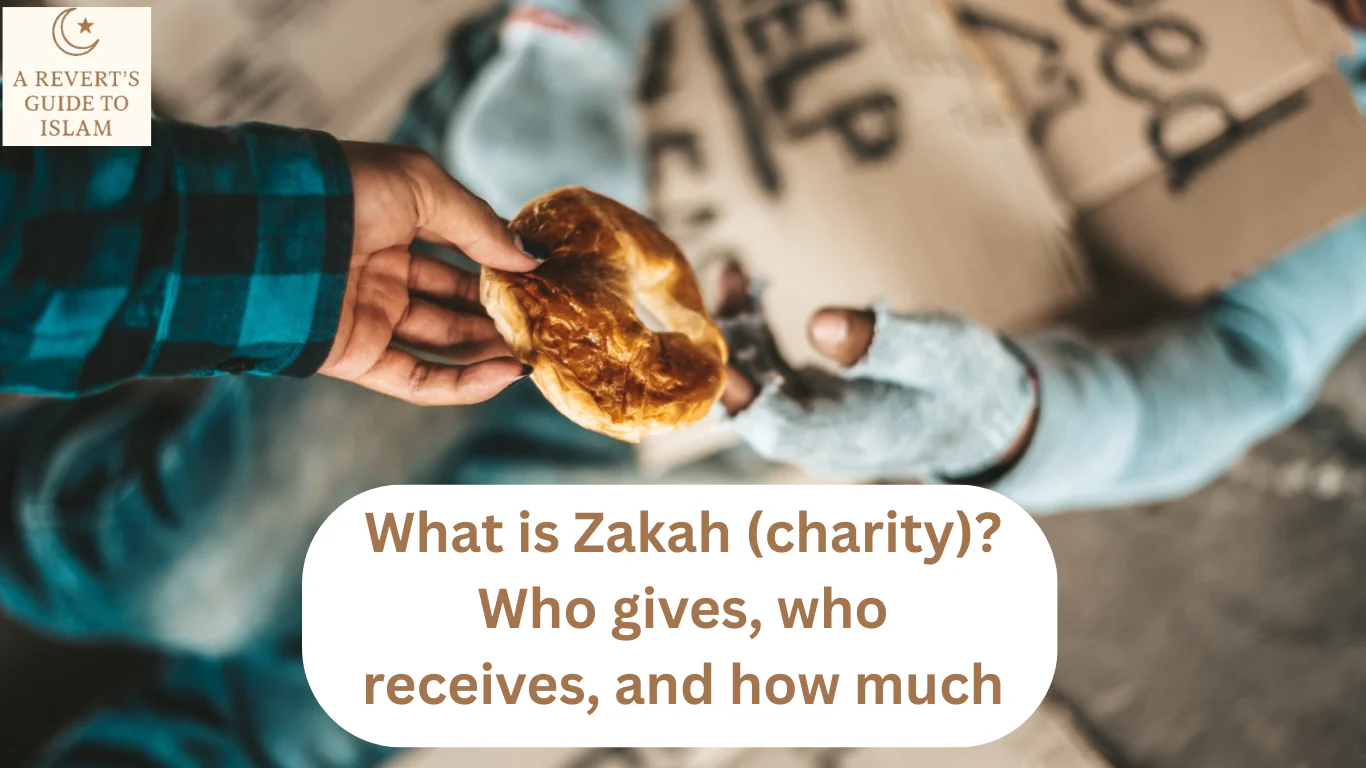What is Zakah (charity)? Who gives, who receives, and how much

Introduction: The Essence of Zakah in Islam
At Reverts Guide to Islam, we believe understanding the spiritual depth of Islamic principles begins with grasping their divine purpose and Zakah is one of the most profound. Derived from the Arabic root meaning “to purify” and “to grow,” Zakah represents both spiritual cleansing and social harmony. It reminds believers that wealth is not a private possession but a trust from Allah, meant to uplift others. Through Zakah, Muslims purify their earnings, nurture empathy, and maintain balance within society a sacred act that transforms generosity into worship.
The Linguistic and Spiritual Meaning of Zakah
The term “Zakah” carries dual meanings: purification and growth. By giving a portion of one’s wealth, the believer purifies the soul from greed and the wealth from unethical accumulation. Spiritually, this act cultivates empathy, gratitude, and awareness of the divine order in one’s life.
Zakah as One of the Five Pillars of Islam
As one of Islam’s foundational pillars, Zakah stands alongside prayer, fasting, pilgrimage, and faith declaration. It is not a charitable option but a mandatory act of devotion, symbolizing one’s submission to Allah’s command and one’s responsibility toward the community.
The Purpose of Zakah: Purification and Redistribution
Zakah serves two intertwined purposes: spiritual purification and socioeconomic balance. It ensures that wealth circulates, preventing it from accumulating in the hands of a few. By redistributing resources, Zakah fosters dignity and equality within the ummah (community).
Who Is Obligated to Give Zakah?
Zakah becomes obligatory upon those who meet specific financial criteria.
5.1. The Nisab Threshold Explained
The nisab represents the minimum amount of wealth one must possess before Zakah is due. It’s roughly equivalent to the value of 87.48 grams of gold or 612.36 grams of silver. Anyone whose assets exceed this amount for a lunar year is required to pay Zakah.
5.2. Age, Wealth, and Eligibility
Adults of sound mind who possess wealth meeting the nisab are obliged to pay Zakah annually. For children’s wealth, guardians may also fulfill this duty on their behalf to maintain its purity.
Types of Wealth Subject to Zakah
6.1. Gold, Silver, and Cash
Any form of liquid wealth—whether stored as currency, jewelry, or bank savingsis subject to Zakah at 2.5%.
6.2. Business Assets and Trade Goods
Profits, inventory, and business capital are included. Traders are encouraged to assess their holdings annually to ensure fairness and sincerity in their giving.
6.3. Agricultural Produce and Livestock
Farmers and herders must give a portion of their yield or animals when they meet the specified criteria. This acknowledges the divine role in natural abundance.
Who Can Receive Zakah: The Eight Eligible Categories
7.1. The Poor and the Needy
The Quran (9:60) defines eight groups eligible to receive Zakah. The poor (fuqarāʾ) and the needy (masākīn) are at the forefront those without sufficient means for basic living.
7.2. Those in Debt and Striving in the Cause of Allah
Others include debtors unable to repay loans, those striving in Allah’s cause, and travelers stranded away from home. Each category reflects a dimension of human vulnerability that Zakah seeks to uplift.
How Much Zakah Should Be Given?
8.1. The 2.5% Rule
The standard rate for monetary assets is 2.5% of one’s total savings that have been held for a full lunar year.
8.2. Variations Based on Wealth Type
For agricultural produce and livestock, the rate may vary between 5% and 10% depending on irrigation and effort. This nuanced system reflects Islam’s emphasis on fairness.
The Difference Between Zakah and Sadaqah
While Zakah is obligatory, sadaqah (voluntary charity) is limitless. Sadaqah can be given at any time, in any amount, and even through kind words or actions. Both stem from compassion, but Zakah ensures the structural balance of wealth within society.
The Impact of Zakah on Society and the Soul
Zakah eliminates envy, nurtures empathy, and binds communities through mutual care. It purifies the giver’s heart, instills discipline, and reminds believers of the fleeting nature of material wealth. On a societal level, it reduces poverty and promotes sustainable equity.
Common Misconceptions About Zakah and Islam
11.1. “Zakah is just a tax”
Zakah is not taxation it is worship. Unlike secular taxes, its purpose is not governmental gain but divine obedience and moral purification.
11.2. “Only the poor Muslims benefit”
Recipients can include new Muslims, those seeking freedom from bondage, or even non-Muslims in need, depending on context and intention.
11.3. “It’s optional or symbolic”
Zakah is a compulsory duty for those who qualify. Neglecting it without valid reason is a grave sin in Islamic jurisprudence.
Correcting Misunderstandings: The True Spirit of Islamic Charity
Islamic charity transcends material giving; it’s a holistic expression of mercy. It aligns with the Prophet Muhammad’s ﷺ teaching that “charity does not decrease wealth.” Correct understanding transforms giving from obligation into joy.
Conclusion: The Call to Purify and Uplift Humanity
Zakah is a timeless bridge between the fortunate and the less privileged—a spiritual contract rooted in justice, mercy, and unity. Through sincere giving, the believer not only purifies wealth but also enriches the soul, embodying the very essence of Islam’s compassion.
- AI
- Vitamins
- Health
- Admin/office jobs
- News
- Art
- Causes
- Crafts
- Dance
- Drinks
- Film
- Fitness
- Food
- Παιχνίδια
- Gardening
- Health
- Κεντρική Σελίδα
- Literature
- Music
- Networking
- άλλο
- Party
- Religion
- Shopping
- Sports
- Theater
- Wellness


